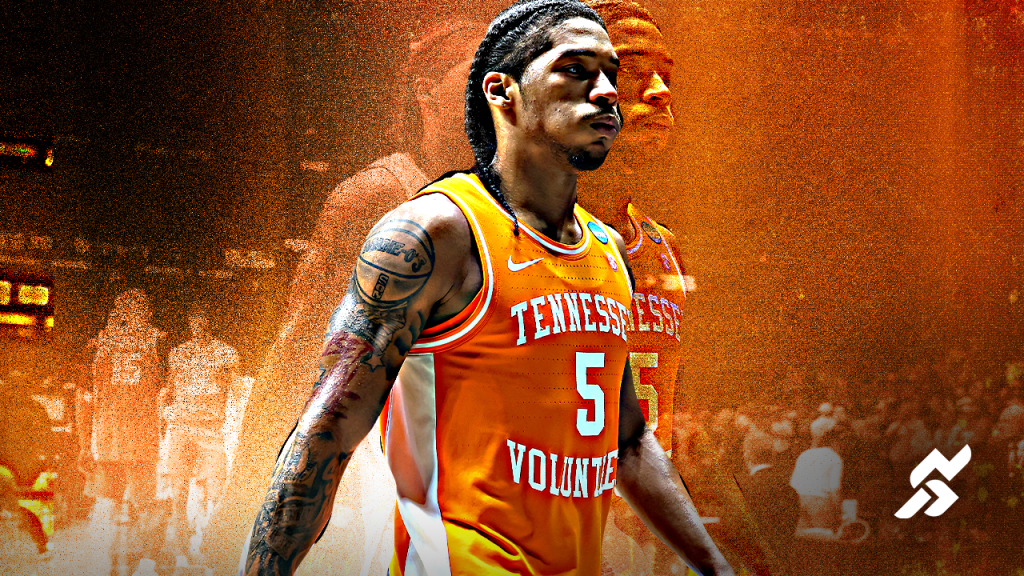The NCAA on Monday motioned a federal judge to deny Zakai Zeigler’s motion for an injunction in his antitrust lawsuit to keep playing playing Division I basketball as a college graduate who already played four D-1 seasons. The NCAA’s motion sends a warning that Zeigler’s lawsuit could open the door to numerous players staying on teams for years after they graduate—and taking spots away from incoming freshmen.
Zeigler, 22, graduated from the University of Tennessee last month. The 5-foot-9 native of Long Island, N.Y. is a two-time SEC Defensive Player of the Year and set several team records. He played all four seasons at Tennessee, where he also received recognition for academic achievement.
Zeigler would like to play a fifth season as a graduate student, but the NCAA only allows four seasons of intercollegiate competition within a five-year window. Zeigler contends the four-seasons rule violates antitrust law by depriving him and similarly situated players of athletic skill development and NIL opportunities—Zeigler contends he’d earn as much as $4 million in NIL in 2025-26 since he’s a well-known and successful college player from a prominent program. He argues there’s a less restrictive approach where the NCAA could allow for an additional season if a player completed their undergraduate degree in four years, meaning they did not red shirt and their academic advancement followed the typical path for college students.
The NCAA repudiates Zeigler’s arguments in a brief authored by Taylor J. Askew and Rakesh Kilaru and colleagues from Holland & Knight and Wilkinson Stekloff. Among the points raised in the NCAA’s brief is that Zeigler is not an NBA prospect and thus an additional season is unlikely to make him a candidate for the NBA. “All publicly available evidence indicates that Plaintiff, respectfully, has a difficult path to the NBA, at this juncture,” the brief states.
The brief acknowledges that Zeigler is a terrific college player—he’s the all-time leading scorer and assist leader in Tennessee history—but pivots from that point to assert, “presumably, if [Zeigler] had a viable path to the NBA, given his resume, he would already be a viable prospect. After all, NBA scouts would have seen him play in 138 collegiate contests.” The brief also bluntly mentions, “there is no proof in the record that Plaintiff was even invited to either the NBA Combine or G-League Combine this year.”
Similarly, the NCAA highlights how “there is no evidence that one more season of participation in college basketball is necessary” for Zeigler to play pro hoops. To that point, Zeigler could have tried to join the NBA, G League or a foreign league years ago. He met their minimum age and experience requirements but chose to remain in college and advance toward a degree.
Zeigler is also depicted as selfish. As the NCAA spins it, Zeigler is asking a court to make him the first college athlete “in history” to obtain a judicial decree to play a fifth season “as a matter of right.” If Zeigler is granted that chance, there would be a loser: a roster spot for a graduating high school senior would otherwise join the Volunteers would be “reapportioned” to Zeigler.
In fact, the NCAA estimates that if college seniors who played four seasons could play another season and chose to do so, somewhere between 20% and 25% of roster spots that would have gone to incoming freshmen would be lost. “While Plaintiff focuses only on what that means for himself,” the NCAA writes, “he does so to the detriment of the entering student-athletes who dream of being the next Zakai Zeigler.”
In that same spirit, the NCAA defends the four seasons rule as reflecting “the lifecycle of a collegiate athlete.” Stated differently, NCAA sports are intended to be a career. A college student plays a sport and their college athletic career time ordinarily ends when they graduate. This “lifecycle,” the NCAA argues, ensures a “steady stream of opportunities” for graduating high school players to gain a college education and play sports.
“College athletics,” the NCAA asserts, “is a means to a better end for student-athletes—not the end itself.”
The NCAA also maintains that Zeigler, like other athletes who have sued the NCAA in recent months to extend their eligibility, has “misapprehended” the U.S. Supreme Court’s decision in NCAA v. Alston (2021) for legal principles that the Court rejected.
Although Alston is sometimes linked to NIL, the case had nothing to do with NIL. The NCAA stresses that Alston only addressed compensation rules for athletes’ education-related expenses, which are subject to antitrust scrutiny since they involve commercial activity. However, Alston does “not touch” eligibility rules, which the NCAA asserts fall outside the scope of antitrust scrutiny. As the NCAA tells it, eligibility rules are not about commercial transactions and instead concern who counts as a college athlete—a “necessary” ingredient “to create the product of collegiate sports.” Even Justice Brett Kavanaugh’s oft-cited concurring opinion, in which lambasted the NCAA and amateurism, explicitly stated that Alston “involves only a narrow subset of the NCAA’s compensation rules.”
The NCAA further asserts that relevant precedent in the U.S. Court of Appeals for the Sixth Circuit, which governs the Tennessee federal court where Zeigler sued, also instructs that eligibility rules fall outside the scope of antitrust scrutiny. As the NCAA recently cited in an appellate brief in Vanderbilt quarterback Diego Pavia’s case against the NCAA regarding eligibility rules, the Sixth Circuit held in Claude Bassett v. NCAA (2008) that enforcement of NCAA rules “is not within the purview of antitrust law” since those rules are not related to commercial or business activities.
Another alleged defect in Zeigler’s lawsuit is that it has “no limiting principle,” meaning if a player has a legal right to play a fifth season so they can earn more NIL and further refine athletic skills, the same player could raise the same argument for a sixth season and so on. Universities have no shortage of graduate programs in which an athlete could remain enrolled for, at least in theory, many years.
The NCAA also contends that a core premise of Zeigler’s lawsuit, which argues that removing experienced college players harms the labor market, is erroneous. While Zeigler suggests NIL deals are most lucrative for seniors, the NCAA says “non-seniors, on average, have higher NIL valuations than seniors.” The NCAA’s expert witness, Cal Berkeley economics professor Matthew Backus, provided a declaration referencing that individual NIL valuations for college basketball players shows that non-seniors’ have a higher average NIL valuation than seniors, $1.2 million compared to $1.07 million.
The issuance of a preliminary injunction for Zeigler, the NCAA argues, is also misplaced because any harm he suffers from not playing can be quantified. A core element to a preliminary injunction is that denial of one by a judge would likely cause the plaintiff irreparable harm, meaning a harm that money damages can’t remedy.
The NCAA maintains there are several problems with Zeigler claiming irreparable harm. One is that he “has known since his first day on campus that he had five years to complete four seasons” and yet waited until after he graduated college to sue. The NCAA believes that Zeigler manufactured an emergency when in reality, he could have sued years ago, giving the court time to review the case’s merits.
Also, the NCAA asserts, any injury Zeigler suffers by a denial to keep playing would be calculable.
The NCAA notes that Zeigler didn’t enter the transfer portal, “unlike 100+ other collegiate basketball players who have exhausted their eligibility but are either contemplating suing for more or hoping for an NCAA rule change.” If Zeigler plays another season, “he will assuredly play for the University of Tennessee,” the NCAA points out. Zeigler submitted a supporting exhibit of data from Spyre Sports Group, which has an NIL collective for Tennessee athletics and estimates Zeigler’s NIL value in another season would be worth $2 million to $4 million. That is important, the NCAA maintains, because it shows Zeigler’s potential legal injury could be resolved by monetary damages if he eventually wins a trial.
U.S. District Judge Katherine A. Crytzer will hold a hearing on Zeigler’s motion for a preliminary injunction on Friday at 1:45 pm local time in a Knoxville (Tenn.) federal courthouse.




